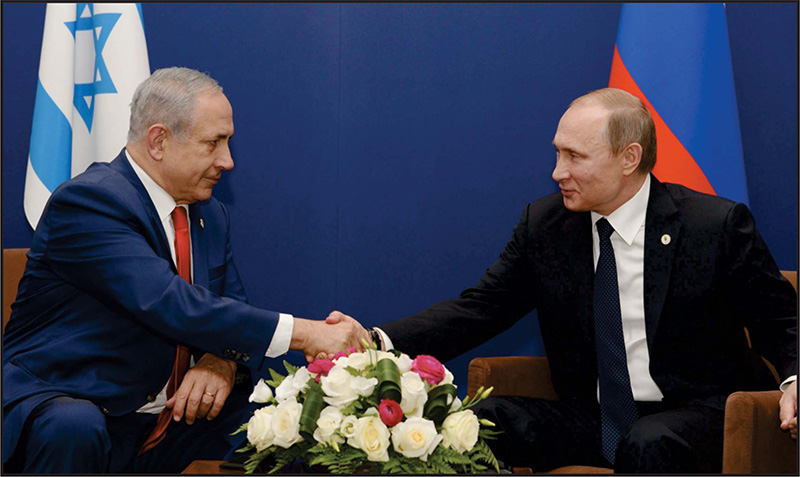Friends, Enemies and Frenemies: Syria, Russia, Turkey, the US, Israel and the New Reality of the Middle East
On The Mark
 By Dr. Mark Meirowitz
By Dr. Mark Meirowitz
Columnist of the Jewish Post
The Middle East is usually chaotic, but the latest developments are beyond belief. The confluence of recent events has led to tremendous turmoil in an already turbulent region of the world: Specifically:
Turkey shot down a Russian jet, claiming that the jet entered Turkish airspace. As a result, Russia announced that it would implement a whole array of retaliatory measures including a boycott of Turkish agricultural products, shutting down the Turkish stream pipeline project and eliminating visa-free travel between Turkey and Russia. Turkeys President Erdogan claimed the shoot down was an error and has tried to apologize to President Putin, but to no avail. In an address to the Russian Duma, while noting that the Turkish people are kind, hard working and talented and that Russia has friends in Turkey.
 Israels Prime Minister, Benjamin Netanyahu (on left in photo), attended last week in Paris, together with some 140 leaders from around the world, a major international conference on global climate change that since the terrorist attacks in Paris earlier this month has also morphed into a demonstration of solidarity with France and an international statement against terrorism. Netanyahu met with world leaders, among them the following presidents and prime ministers, among them Russias President, Vladimir Putin (on right in photo). Photo: Amos Ben Gershom/GPO for Israel Sun
Israels Prime Minister, Benjamin Netanyahu (on left in photo), attended last week in Paris, together with some 140 leaders from around the world, a major international conference on global climate change that since the terrorist attacks in Paris earlier this month has also morphed into a demonstration of solidarity with France and an international statement against terrorism. Netanyahu met with world leaders, among them the following presidents and prime ministers, among them Russias President, Vladimir Putin (on right in photo). Photo: Amos Ben Gershom/GPO for Israel Sun
Putin accused the Turkish leadership of letting terrorists prosper from the sale of oil in Syria, a charge which President Erdogan called a slander and stated that he would resign as Turkeys president if such allegations were proved. Putin also wondered aloud why the Turks would have shot down the Russian plane, stating that Allah only knows why, and that probably, Allah has decided to punish the ruling clique in Turkey by taking their mind and reason. Extraordinarily harsh words from a world leader, a situation which does not augur well for future Turkish-Russian relations;
Israels Prime Minister Netanyahu and Russias President Putin had a very successful meeting at which Putin praised the mechanism of cooperation between Israel and Russia which had been established in connection with Russias military operations in Syria;
Israel Defense Minister Moshe Yaalon said that a Russian plane which mistakenly entered Israeli airspace was not shot down and immediately turned around when the Russians were notified;
Turkeys President Erdogan told an Israeli Radio station that he believes that it is possible to repair frayed relations between Turkey and Israel;
Israels Defense Minister Yaalon, at a recent conference, stated that the US is receding in its influence in the region while Russia and Iran are gaining power and influence. Said Yaalon: we dont like the fact that King Abdullah of Jordan is going to Moscow, the Egyptians are going to Moscow, the Saudis are going to MoscowThe United States should play a more active role in the region.
President Obamas policy has been one of retrenchment in the Middle East he has tried again and again to withdraw and disengage but events have pulled him back, especially with respect to the battle against ISIS (and of course following San Bernardino). Russia, on the other hand, is implementing its strategy of remaining entrenched in the Middle East, starting with Syria, where it is bolstering its ally Assad and spreading its influence throughout the region (together with Iran).
Can Israel benefit from this? It would appear that there are opportunities for a successful involvement for Israel in connection with Syria and ISIS. Israels real bte noire is the rise of Iran (with the implementation of the Iran Nuclear Deal) and the arming and empowering of Hezbollah. Only by working with the Russians can Israel make progress in containing Iran and Hezbollah (both allies of the Russians in backing up Assad)(In the past the Israelis have used the Russians as go-betweens to push back Hezbollah with this renewed cooperation with Russia, Israel will be in an ever better position to deter Hezbollah and its sponsor, Iran) To be candid, in all the time Assad was in power, there was no war between Syria and Israel. It may even be in Israels interest to keep Assad in power. Should Assad be toppled, that might lead to a hellish failed state with ISIS, Al Nusra, and all sorts of other elements dangerous to Israel in power and eager to expand their power and influence (with the next target being Israel).
Further, Israel is now in a good position to reinstate its previous good relations with Turkey. It is no coincidence that after the Turkish elections on June 7 (as a result of which the majority AKP party of President Erdogan lost its parliamentary majority), on June 22nd, there was a secret meeting between Israels foreign ministry head Dore Gold and the Undersecretary of the Turkish Foreign Ministry. The radio interview with Erdogan on Israel radio indicating that relations with Israel could be repaired is also a positive indication. Turkish politics does often demonstrate predictable unpredictability, but, in this case, with Turkeys relations with Russia souring, a re-establishment of high level relations with Israel can only benefit Turkey on many levels. In particular, assuming the Russians also cut off some or all of the natural gas it supplies to Turkey (more than 49%) (which Turkey uses to produce electricity) in retaliation for the shoot down of the Russian jet, Israels new energy finds could help substitute for this loss.
There has also been a great deal of talk about a possible pipeline deal between Turkey and Israel (which could dampen the loss of the Turkish Stream pipeline deal with Russia). I should note, however, that it will be impossible to restore high level Israel-Turkey relations so long as Hamas operates from Turkey (and Hamas has even been accused of running terror operations in the West Bank from Turkey) that is a no-starter. Further, Israel-Turkey relations cant operate like a rollercoaster namely, Turkey's often acting in lock step with the Palestinians. The Turks need have a more balanced approach to Israel and the Palestinians - so that Turkey can be a neutral mediator and facilitator as it was in the past between Syria and Israel. Obviously there are no easy solutions. Finally, Israel-Turkey trade has been robust and is on the upswing, so that is at least one strong positive development that can help cement political relations between the two countries.
As far as the United States is concerned, if Obama and Kerry continue their ill-advised Middle East policies and try to force a solution on Israel before Obamas term ends, then Israel would have a possible outlet to gain support from Russia. This is certainly not desirable since the US-Israel relationship needs to be strengthened rather than weakened. Obama and Kerry need to be disabused from believing that solving the Israel-Palestinian dispute will resolve the Middle East crisis. This is particularly true with respect to destroying ISIS (in that solving the Palestinian issue will have zero impact on degrading and destroying ISIS).
In the Middle East, anything is possible. Israel may even benefit from the recent chaotic developments. Let us hope that the situation can eventually calm down and that peace will come to the most turbulent region in the world.
